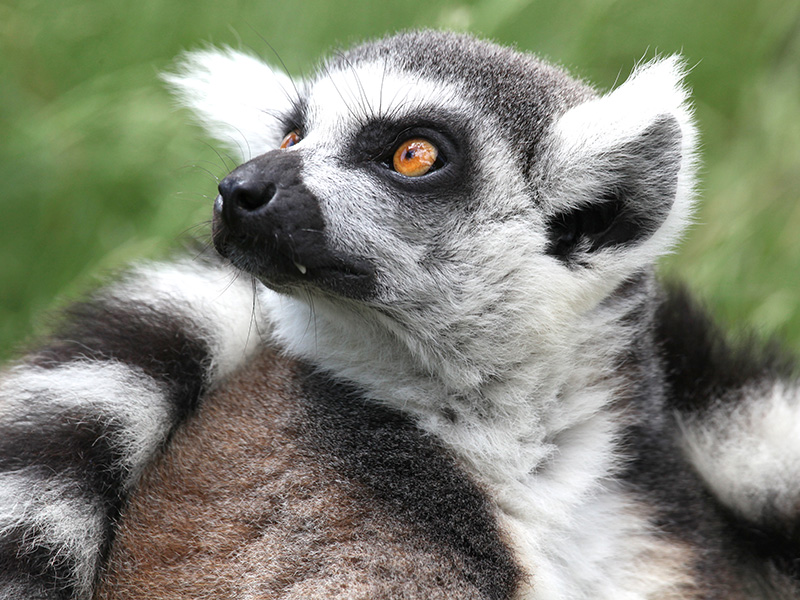‘Lemur Week’ at Cotswold Wildlife Park

Cotswold Wildlife Park hosts ‘Lemur Week’ to help save the world’s most threatened Lemurs from extinction.
To highlight the plight of the world’s most endangered Lemurs, Cotswold Wildlife Park hosts its annual ‘Lemur Week’ from 25th May – 2nd June 2019. Its aim is to raise awareness and funds for the Park’s conservation projects helping to save the most threatened Lemurs on earth from extinction. As part of ‘Lemur Week’, visitors will have the chance to take part in a variety of Lemur-themed activities and learn more about these charismatic primates with daily keeper talks inside the Park’s interactive Lemur walk-though exhibit – Madagascar.
Cotswold Wildlife Park is home to one of the rarest primate species on earth - the Greater Bamboo Lemur (Prolemur simus.) The International Union for Conservation of Nature (IUCN) have described Greater Bamboo Lemurs as the most endangered Lemur in Madagascar and one of the top five endangered primates in the world. The Park is also home to another rare and iconic Lemur species – the Crowned Sifaka (Propithecus coronatus, pictured above). Very few zoological collections in the world keep these species and both are part of a European Breeding Programme (EEP).
Curator of Cotswold Wildlife Park, Jamie Craig, said: “Lemur species in Madagascar are under tremendous pressure from habitat destruction and the rapidly rising human population. It is vital that we raise awareness for this unique group of primates before it is too late. At Cotswold Wildlife Park, we are committed to conserving this species and we fund an extremely important site in Madagascar as well as participating in several other conservation projects with the Cotswold Wildlife Park Conservation Trust – most notable for the Crowned Sifaka and Greater Bamboo Lemur. We are extremely privileged to keep both of these species at the Park - they are extremely rare in captivity and they are fantastic ambassadors for our fundraising efforts”.
Lemurs are native to Madagascar – an ancient island in the Indian Ocean. Once joined to Africa, Madagascar has been isolated for millions of years. As a result, it has evolved an eclectic set of highly specialised wildlife - eighty per cent of which is unique to the island and is startlingly different from anything found elsewhere in the world.
Despite having only one natural predator on the island, the Fossa, many Lemur species are critically endangered. Escalating demands from human activities (such as deforestation, hunting and rapid agricultural growth) have placed enormous pressure on the island’s unique wildlife. Madagascar is now considered to be one of the world’s top conservation priorities. Habitat loss has had a catastrophic effect on Lemur populations. Timber is being smuggled out of Madagascar at an alarming rate. In 2010, custom officers at Mombasa seized 420 tonnes of illegally felled Malagasy rosewood timber (worth an estimated $13 million), destined mostly for China. Approximately ninety per cent of the island’s forests and ecosystems had been denuded. In addition to drastic loss of habitat, the illegal bushmeat trade threatens future Lemur populations, especially as Lemurs don’t reproduce often – or even every year. As a result, many species are on the verge of extinction and without immediate conservation efforts, will be wiped out. For this reason, in 2013, the Cotswold Wildlife Park Conservation Trust was established. Its aim is to fund vital conservation projects to preserve future generations of Madagascar’s rarest Lemurs, including the Crowned Sifaka and critically endangered Greater Bamboo Lemur.
Jamie Craig added: “The plight of all species in Madagascar is extremely worrying and the Sifaka are now confined to tiny forest fragments, often in unprotected areas. We are working hard with Malagasy non-governmental organisations to protect these areas and give the species living there a glimmer of hope. The Crowned Sifaka breeding programme is pretty much unique in that it includes some of the wild population, who, in many instances, are essentially trapped by deforestation, farming practices and rising human populations. The work includes translocating certain individuals to ensure these small isolated groups maintain genetic diversity. Any birth of this species is a triumph and the research we do with the captive population is vital to the work carried out in the field.”
Explore Gloucestershire
25 May 2019
For further information.
OTHER NEWS
